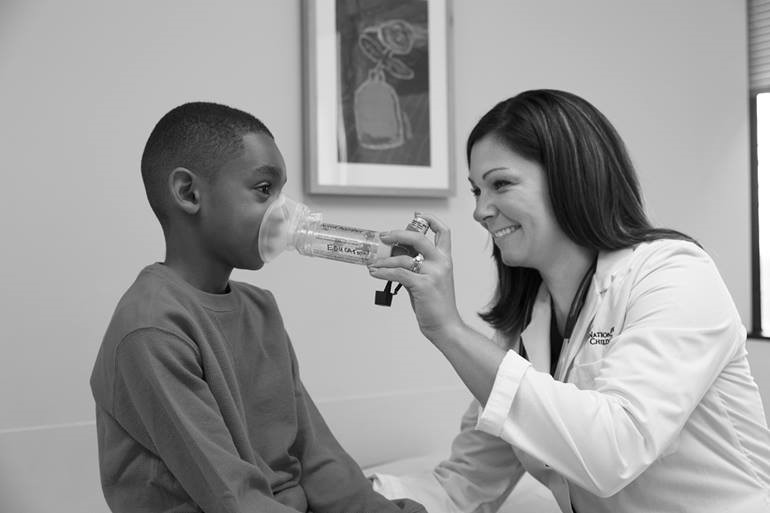Increasing Same-Day Amoxicillin Graded Dose Challenges
Increasing Same-Day Amoxicillin Graded Dose Challenges https://pediatricsnationwide.org/wp-content/uploads/2023/10/AdobeStock_259470506-1024x683.jpg 1024 683 JoAnna Pendergrass, DVM JoAnna Pendergrass, DVM https://pediatricsnationwide.org/wp-content/uploads/2021/03/pendergrass_01.jpg- October 13, 2023
- JoAnna Pendergrass, DVM

A quality improvement initiative overcomes several barriers to de-labeling penicillin allergies.
In a study published in The Journal of Allergy and Clinical Immunology: In Practice, a research team led by Margaret Redmond, MD, a pediatric allergist at Nationwide Children’s Hospital, reported on a quality improvement (QI) initiative that sustainably increased rates of same-day amoxicillin graded dose challenges (GDC) from 2% to 33%.
“Studies estimate that 5 to 10% of pediatric patients have a documented penicillin allergy,” says Dr. Redmond.
However, over 90% of these children can tolerate a subsequent penicillin dose. She notes that benign, delayed rashes that commonly occur after aminopenicillin administration complicate the understanding of pediatric penicillin allergies.
The medical consequences of documented penicillin allergies, such as antibiotic resistance, underscore the need to clarify this allergy. But lack of family and patient interest and the time and effort required for GDCs, among other barriers, impede allergy de-labeling.
The researchers collected and analyzed same-day amoxicillin GDCs data for new Nationwide Children’s allergy patients who were referred because of a documented penicillin allergy. The baseline 2% GDC rate was established between January and August 2018.
Same-day GDCs, the researchers note, limit the need for follow-up visits and reduce health care costs.
“Before we could perform same-day challenges, many of my patients wished that they did not need to come back on a separate day, secondary to missing work and school or the travel required to get to clinic,” says Dr. Redmond.
The patients were first assessed for risk of an IgE-mediated drug allergy. Patients at low risk for this allergy or other severe adverse drug reactions could receive a GDC without prior skin testing.
For the GDC, patients were given 10% of the treatment dose of oral amoxicillin and monitored for 30 minutes. Patients were then given the remaining 90% and monitored for 60 minutes.
Several QI interventions were implemented in 2018 and 2019. The first was to pre-order the amoxicillin from the pharmacy before the patient’s arrival. However, this approach ended up being unsuccessful because a patient’s updated weight needed to be recorded in the electronic medical record before the pharmacy could fill the order.
The second intervention was to make amoxicillin available in the allergy clinic, which successfully increased the same-day GDC rate to between 19% and 36%.
The final intervention was to schedule GDC appointments earlier in the day, given that some eligible patients had appointments that were too late in the day to allow for challenge completion. This intervention increased the rate to between 23% and 42%.
These successes established a new baseline GDC rate of 33%.
Several changes in clinic processes were also executed, such as educating patients and families on the benefits of same-day GDCs.
“These results are generalizable to allergy clinics at other pediatric institutions, but potential barriers to implementation include availability of staff to administer the medication and having the space to monitor patients after administration,” notes Dr. Redmond.
This article also appears in the Fall/Winter 2023 print issue. Download the full issue.
Reference:
Redmond M, Scherzer R, Hardy C, Macias C, Samora J, Stukus D. In-office amoxicillin to increase graded dose challenges at initial evaluation for penicillin allergy. The Journal of Allergy and Clinical Immunology: In Practice. 2023;11(7):2190-2195.
Image credit: Adobe Stock
About the author
JoAnna Pendergrass, DVM, is a veterinarian and freelance medical writer in Atlanta, GA. She received her veterinary degree from the Virginia-Maryland College of Veterinary Medicine and completed a 2-year postdoctoral research fellowship at Emory University’s Yerkes Primate Research Center before beginning her career as a medical writer.
As a freelance medical writer, Dr. Pendergrass focuses on pet owner education and health journalism. She is a member of the American Medical Writers Association and has served as secretary and president of AMWA’s Southeast chapter.
In her spare time, Dr. Pendergrass enjoys baking, running, and playing the viola in a local community orchestra.
-
JoAnna Pendergrass, DVMhttps://pediatricsnationwide.org/author/joanna-pendergrass-dvm/
-
JoAnna Pendergrass, DVMhttps://pediatricsnationwide.org/author/joanna-pendergrass-dvm/
-
JoAnna Pendergrass, DVMhttps://pediatricsnationwide.org/author/joanna-pendergrass-dvm/
-
JoAnna Pendergrass, DVMhttps://pediatricsnationwide.org/author/joanna-pendergrass-dvm/
- Posted In:
- Clinical Updates
- In Brief
- Research










